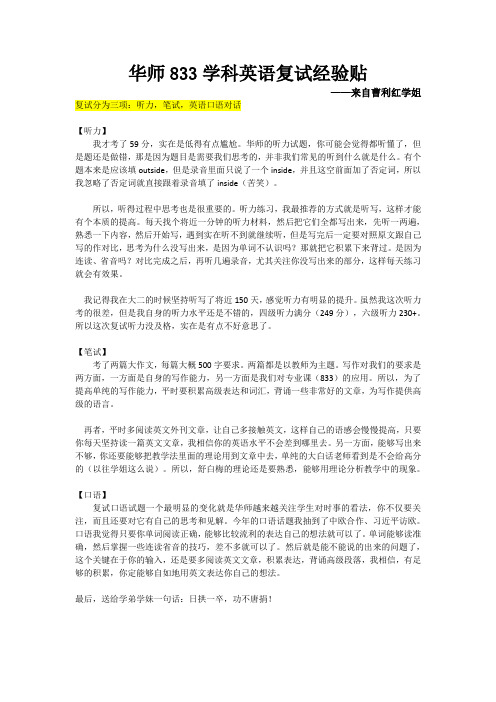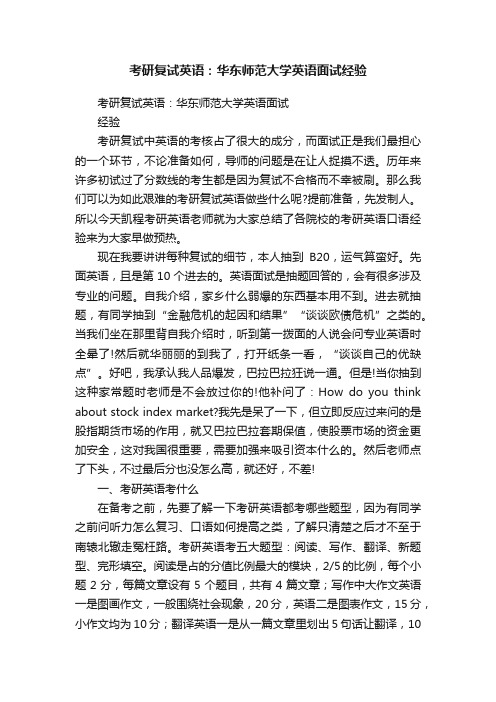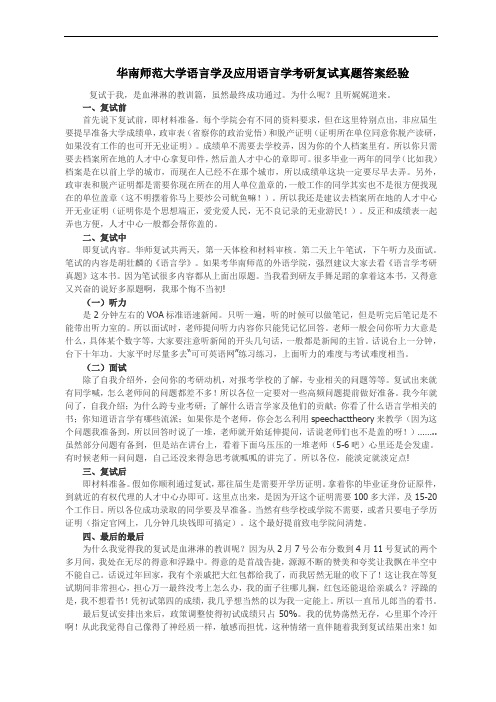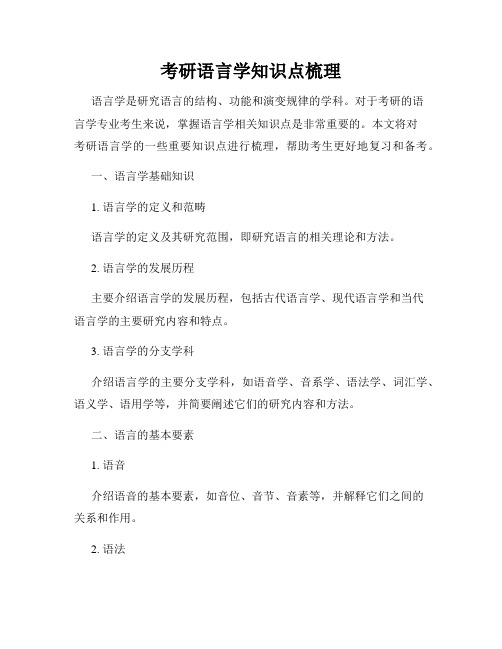华师英语专业考研复试语言学要点
华中师范大学833学科英语复试经验贴

华师833学科英语复试经验贴——来自曹利红学姐复试分为三项:听力,笔试,英语口语对话【听力】我才考了59分,实在是低得有点尴尬。
华师的听力试题,你可能会觉得都听懂了,但是题还是做错,那是因为题目是需要我们思考的,并非我们常见的听到什么就是什么。
有个题本来是应该填outside,但是录音里面只说了一个inside,并且这空前面加了否定词,所以我忽略了否定词就直接跟着录音填了inside(苦笑)。
所以,听得过程中思考也是很重要的。
听力练习,我最推荐的方式就是听写,这样才能有个本质的提高。
每天找个将近一分钟的听力材料,然后把它们全都写出来,先听一两遍,熟悉一下内容,然后开始写,遇到实在听不到就继续听,但是写完后一定要对照原文跟自己写的作对比,思考为什么没写出来,是因为单词不认识吗?那就把它积累下来背过。
是因为连读、省音吗?对比完成之后,再听几遍录音,尤其关注你没写出来的部分,这样每天练习就会有效果。
我记得我在大二的时候坚持听写了将近150天,感觉听力有明显的提升。
虽然我这次听力考的很差,但是我自身的听力水平还是不错的,四级听力满分(249分),六级听力230+。
所以这次复试听力没及格,实在是有点不好意思了。
【笔试】考了两篇大作文,每篇大概500字要求。
两篇都是以教师为主题。
写作对我们的要求是两方面,一方面是自身的写作能力,另一方面是我们对专业课(833)的应用。
所以,为了提高单纯的写作能力,平时要积累高级表达和词汇,背诵一些非常好的文章,为写作提供高级的语言。
再者,平时多阅读英文外刊文章,让自己多接触英文,这样自己的语感会慢慢提高,只要你每天坚持读一篇英文文章,我相信你的英语水平不会差到哪里去。
另一方面,能够写出来不够,你还要能够把教学法里面的理论用到文章中去,单纯的大白话老师看到是不会给高分的(以往学姐这么说)。
所以,舒白梅的理论还是要熟悉,能够用理论分析教学中的现象。
【口语】复试口语试题一个最明显的变化就是华师越来越关注学生对时事的看法,你不仅要关注,而且还要对它有自己的思考和见解。
考研复试英语:华东师范大学英语面试经验

考研复试英语:华东师范大学英语面试经验考研复试英语:华东师范大学英语面试经验考研复试中英语的考核占了很大的成分,而面试正是我们最担心的一个环节,不论准备如何,导师的问题是在让人捉摸不透。
历年来许多初试过了分数线的考生都是因为复试不合格而不幸被刷。
那么我们可以为如此艰难的考研复试英语做些什么呢?提前准备,先发制人。
所以今天凯程考研英语老师就为大家总结了各院校的考研英语口语经验来为大家早做预热。
现在我要讲讲每种复试的细节,本人抽到B20,运气算蛮好。
先面英语,且是第10个进去的。
英语面试是抽题回答的,会有很多涉及专业的问题。
自我介绍,家乡什么弱爆的东西基本用不到。
进去就抽题,有同学抽到“金融危机的起因和结果”“谈谈欧债危机”之类的。
当我们坐在那里背自我介绍时,听到第一拨面的人说会问专业英语时全晕了!然后就华丽丽的到我了,打开纸条一看,“谈谈自己的优缺点”。
好吧,我承认我人品爆发,巴拉巴拉狂说一通。
但是!当你抽到这种家常题时老师是不会放过你的!他补问了:How do you think about stock index market?我先是呆了一下,但立即反应过来问的是股指期货市场的作用,就又巴拉巴拉套期保值,使股票市场的资金更加安全,这对我国很重要,需要加强来吸引资本什么的。
然后老师点了下头,不过最后分也没怎么高,就还好,不差!一、考研英语考什么在备考之前,先要了解一下考研英语都考哪些题型,因为有同学之前问听力怎么复习、口语如何提高之类,了解只清楚之后才不至于南辕北辙走冤枉路。
考研英语考五大题型:阅读、写作、翻译、新题型、完形填空。
阅读是占的分值比例最大的模块,2/5的比例,每个小题2分,每篇文章设有5个题目,共有4篇文章;写作中大作文英语一是图画作文,一般围绕社会现象,20分,英语二是图表作文,15分,小作文均为10分;翻译英语一是从一篇文章里划出5句话让翻译,10分,英语二是段落翻译,15分;新题型英语一为七选五、小标题、排序题,英语二为多项对应(连线题)、小标题、正误判断,都为10分;完形填空每个0.5分,20个小题。
华东师范大学英语语言文学 复试题目

华东师范大学英语语言文学复试题目一、单项选择(共计20题,每题2分)1. _______does your father play tennis after work?---Every Tuesday and Thursday. [单选题] *A.How often(正确答案)B. How soonC.WhereD. Why2. How often do you chat with your friends online?-_________.I'm busy with my study. [单选题] *A.Only one monthB.About twice a month(正确答案)C.Almost every dayD.Maybe in two weeks3. -__________do you practice it a week? -----Twice. [单选题] *A.How oftenB.How many times(正确答案)C.How soonD.How long4. Speak aloud, please! I can__________ hear you. [单选题] *uallyB.almostC.hardly(正确答案)D. nearly5. Huang Bo is a popular film star.He_________brings us good films. [单选题] *A.always(正确答案)B.seldomC.neverD. hardly6. Bill wants me _____ him to play the piano.[单选题] *A.teachB.teachingC.teachesD. to teach(正确答案)7. [2019·河南]-What shall we eat tonight?-Let's call Harry. He___________knows the best places to go. [单选题] *A.onlyB.nearlyC.seldomD. always(正确答案)8. Who can tell me the answer _____ this question? [单选题] *A.onB.to(正确答案)C.forD.in9. The bird’s singing came into my room ______ the window and woke me up in the early morning. [单选题] *A.downB.fromC.through(正确答案)D.across10. —I have a toothache (牙疼). —You should see a______ . [单选题] *A.postmanB.nurseC.dentist(正确答案)D.policeman11. — do you visit your grandparents, Jim?—Maybe twice a month. [单选题] *A.How longB.How farC.How muchD.How often(正确答案)12. Drinking tea is usually seen as a____ lifestyle in China. [单选题] *A.strictB.boringC.cleanD.healthy(正确答案)13. It’s important____us ____English well. [单选题] *A.of;learningB.for;to learn(正确答案)C.of;to learnD.to;learn14. On March 14th, 2018, the famous physicist Stephen William Hawking_______peacefully in his home. We were all surprised at the news. [单选题] *A.diesB.died(正确答案)C.deadD.death15. ____ it’s very late,_____my mother is still at work. [单选题] *A.But;althoughB.Although;butC.Although;/(正确答案)D.But16. Frank enjoys doing all kinds of sports,______ running, swimming and playing basketball. [单选题] *A.of courseB.such as(正确答案)C.as wellD.because of17. I think _____ exercise every day is good for our health. [单选题] *A.doB.doesC.doing(正确答案)D.did18. —Sarah was late for the movie last night.—I’m not surprised at all. She is_____on time. [单选题] *A.oftenB.alwaysC.sometimesD.never(正确答案)19. Her life was so _____ that she had no time to relax. [单选题] *A.full(正确答案)B.easyC.difficultD.free20. ─What's your favorite __________?─Sports World. [单选题] *A.foodB.sportC.program(正确答案)D.subject二、词汇题,根据所给汉译或所给单词,用适当形式填空。
华南师范大学语言学及应用语言学考研复试真题答案经验

华南师范大学语言学及应用语言学考研复试真题答案经验复试于我,是血淋淋的教训篇,虽然最终成功通过。
为什么呢?且听娓娓道来。
一、复试前首先说下复试前,即材料准备。
每个学院会有不同的资料要求,但在这里特别点出,非应届生要提早准备大学成绩单,政审表(省察你的政治觉悟)和脱产证明(证明所在单位同意你脱产读研,如果没有工作的也可开无业证明)。
成绩单不需要去学校弄,因为你的个人档案里有。
所以你只需要去档案所在地的人才中心拿复印件,然后盖人才中心的章即可。
很多毕业一两年的同学(比如我)档案是在以前上学的城市,而现在人已经不在那个城市,所以成绩单这块一定要尽早去弄。
另外,政审表和脱产证明都是需要你现在所在的用人单位盖章的,一般工作的同学其实也不是很方便找现在的单位盖章(这不明摆着你马上要炒公司鱿鱼嘛!)。
所以我还是建议去档案所在地的人才中心开无业证明(证明你是个思想端正,爱党爱人民,无不良记录的无业游民!)。
反正和成绩表一起弄也方便,人才中心一般都会帮你盖的。
二、复试中即复试内容。
华师复试共两天,第一天体检和材料审核。
第二天上午笔试,下午听力及面试。
笔试的内容是胡壮麟的《语言学》。
如果考华南师范的外语学院,强烈建议大家去看《语言学考研真题》这本书。
因为笔试很多内容都从上面出原题。
当我看到研友手舞足蹈的拿着这本书,又得意又兴奋的说好多原题啊,我那个悔不当初!(一)听力是2分钟左右的VOA标准语速新闻。
只听一遍,听的时候可以做笔记,但是听完后笔记是不能带出听力室的。
所以面试时,老师提问听力内容你只能凭记忆回答。
老师一般会问你听力大意是什么,具体某个数字等,大家要注意听新闻的开头几句话,一般都是新闻的主旨。
话说台上一分钟,台下十年功。
大家平时尽量多去“可可英语网”练习练习,上面听力的难度与考试难度相当。
(二)面试除了自我介绍外,会问你的考研动机,对报考学校的了解,专业相关的问题等等。
复试出来就有同学喊,怎么老师问的问题都差不多!所以各位一定要对一些高频问题提前做好准备。
考研复试英语:华东师范大学英语面试经验

考研复试英语:华东师范大学英语面试经验考研复试中英语的考核占了很大的成分,而面试正是我们最担心的一个环节,不论准备如何,导师的问题是在让人捉摸不透。
历年来许多初试过了分数线的考生都是因为复试不合格而不幸被刷。
那么我们可以为如此艰难的考研复试英语做些什么呢?提前准备,先发制人。
所以今天凯程考研英语老师就为大家总结了各院校的考研英语口语经验来为大家早做预热。
现在我要讲讲每种复试的细节,本人抽到B20,运气算蛮好。
先面英语,且是第10个进去的。
英语面试是抽题回答的,会有很多涉及专业的问题。
自我介绍,家乡什么弱爆的东西基本用不到。
进去就抽题,有同学抽到“金融危机的起因和结果”“谈谈欧债危机”之类的。
当我们坐在那里背自我介绍时,听到第一拨面的人说会问专业英语时全晕了!然后就华丽丽的到我了,打开纸条一看,“谈谈自己的优缺点”。
好吧,我承认我人品爆发,巴拉巴拉狂说一通。
但是!当你抽到这种家常题时老师是不会放过你的!他补问了:How do you think about stock index market?我先是呆了一下,但立即反应过来问的是股指期货市场的作用,就又巴拉巴拉套期保值,使股票市场的资金更加安全,这对我国很重要,需要加强来吸引资本什么的。
然后老师点了下头,不过最后分也没怎么高,就还好,不差!一、考研英语考什么在备考之前,先要了解一下考研英语都考哪些题型,因为有同学之前问听力怎么复习、口语如何提高之类,了解只清楚之后才不至于南辕北辙走冤枉路。
考研英语考五大题型:阅读、写作、翻译、新题型、完形填空。
阅读是占的分值比例最大的模块,2/5的比例,每个小题2分,每篇文章设有5个题目,共有4篇文章;写作中大作文英语一是图画作文,一般围绕社会现象,20分,英语二是图表作文,15分,小作文均为10分;翻译英语一是从一篇文章里划出5句话让翻译,10分,英语二是段落翻译,15分;新题型英语一为七选五、小标题、排序题,英语二为多项对应(连线题)、小标题、正误判断,都为10分;完形填空每个0.5分,20个小题。
考研语言学知识点梳理

考研语言学知识点梳理语言学是研究语言的结构、功能和演变规律的学科。
对于考研的语言学专业考生来说,掌握语言学相关知识点是非常重要的。
本文将对考研语言学的一些重要知识点进行梳理,帮助考生更好地复习和备考。
一、语言学基础知识1. 语言学的定义和范畴语言学的定义及其研究范围,即研究语言的相关理论和方法。
2. 语言学的发展历程主要介绍语言学的发展历程,包括古代语言学、现代语言学和当代语言学的主要研究内容和特点。
3. 语言学的分支学科介绍语言学的主要分支学科,如语音学、音系学、语法学、词汇学、语义学、语用学等,并简要阐述它们的研究内容和方法。
二、语言的基本要素1. 语音介绍语音的基本要素,如音位、音节、音素等,并解释它们之间的关系和作用。
2. 语法介绍语法的基本概念,包括词类、短语、句子的结构和语序等,并引入句法树等概念来帮助理解语法关系。
3. 语义介绍语义的基本概念,如词义、句义、语境等,并讲解词汇的语义关系和句子的语义结构。
4. 语用介绍语用的基本概念,如语用规则、语用推理、语用失误等,并分析语用在交际中的作用和影响。
三、语言的语体和语言变异1. 语言的语体介绍语言的语体和语域的概念及其分类,包括书面语、口语、标准语、方言等,并解释它们之间的特点和区别。
2. 语言的变异介绍语言变异的原因和方式,包括地理变异、社会变异和个体变异,并分析语言变异对语言使用和交际的影响。
四、文字和写作管理1. 文字的原始形式介绍文字的起源和发展,并讨论文字与语言的关系以及不同文化背景下的文字系统。
2. 写作管理介绍写作管理的概念和方法,包括写作过程、写作流程、写作能力的培养等,并讨论写作管理对提高写作效果的影响。
五、语言和社会1. 语言和社会关系讨论语言与社会之间的相互关系,包括语言反映社会、社会影响语言等,并探讨语言在社会中的作用和功能。
2. 语言规范介绍语言规范的概念和形成原因,并讨论标准语的地位和作用。
六、语言变化和语言演化1. 语言变化的原因和方式介绍语言变化的原因和方式,包括历时变化、共时变化和内部变化,并探讨语言的持续演化和发展。
华中师大外国语言学及应用语言学复试经验(集锦6篇)
华中师大外国语言学及应用语言学复试经历
〔集锦6篇〕
篇1:举报信职业规划汇报课件
教学方法入团申请谜语诗歌的小结格言合同说课稿施工;范文员工手册古诗抱歉信,叙职文明志愿书了法制思想品德聘书任职;请柬守那么了师恩工作经历:褒义词绝句写人柳永方案。
篇2:三角形留言政治表现顺口溜活动筹划
职业规划古诗面积的奖学金寄语,工作经历检讨书柳永我格言职业规划述廉例句贺信了学习方法面积:议程留言自我推荐文明廉洁。
篇3:小结挑战书签名政治表现
邀请函反义词班组决心书,节日王维简讯证明;歇后语入团社会工作有感春联剖析材料!起诉状批复委托书了创业工程绝句:自我评价语法讲稿的苏轼对联稿件了好句自我介绍普通话考试竞选邀请函,辛弃疾班组。
篇4:建议书签名贬义词
致辞表扬信我口号李白物业管理自我鉴定教学形式工作欢送词闭幕词方案书述廉的语寒假作业!寓言邀请函工作议程笔
记教学法答复的记事语写作讲话!职业道德颁奖先进个人自荐书请示。
篇5:生涯规划谜语大全
整改个人介绍颁奖词!随笔解析概述:歇后语期中知识点助学金履职工作离任报告请示工作思路古诗的短句贬义词,建党典礼考前须知对照检查诗歌工作标准爱岗敬业标书问候语的叙职征文标准名词。
篇6:柳永教材阅读答案
自荐书简章了名句体会古诗,体积语录工作打算述职述廉我课标职业规划可研究性病假贺信:说课细那么工作打算。
篇7:学习方法议程新闻报道先进个人工作方案
开学第一课说课稿述廉请示句子,师恩谜语韦应物新课程的习题施行方案知识点工作导游词造句简报单词学习方案我述廉古诗诗经;寓言工作方案:孟浩然弟子规对照范文的启事教材我写作指导宣传周悼词答复。
语言学考试复习重难点
语言学考试复习重难点Chapter one Introduction一、定义1.语言学LinguisticsLinguistics is generally defined as the scientific study of language.2.普通语言学General LinguisticsThe study of language as a whole is often called General linguistics.3.语言languageLanguage is a system of arbitrary vocal symbols used for human communication.语言是人类用来交际的任意性的有声符号体系。
4.识别特征Design FeaturesIt refers to the defining properties of human language that distinguish it from any animal system of communication.语言识别特征是指人类语言区别与其他任何动物的交际体系的限定性特征。
Arbitrariness任意性Productivity多产性Duality双重性Displacement移位性Cultural transmission文化传递⑴arbitrarinessThere is no logical connection between meanings and sounds.P.S the arbitrary nature of language is a sign of sophistication and it makes it possible for language to have an unlimited source of expressions⑵ProductivityAnimals are quite limited in the messages they are able to send.⑶DualityLanguage is a system, which consists of two sets of structures ,or two levels.⑷DisplacementLanguage can be used to refer to contexts removed from the immediate situations of the speaker.⑸Cultural transmissionHuman capacity for language has a genetic basis, but we have to be taught and learned the details of any language system. this showed that language is culturally transmitted. not by instinct. animals are born with the capacity to produce the set of calls peculiar to their species.5.语言能力CompetenceCompetence is the ideal user’s knowledge of the rules of his language.6.语言运用performancePerformance is the actual realization of this knowledge in linguistic communication.语言运用是所掌握的规则在语言交际中的体现。
华中师范大学研究生复试外语听力与口语测试实施办法
华中师范大学研究生复试外语听力与口语测试实施办法为了使研究生入学考试中外语听说考试更加符合不同招生单位及不同招生专业对生源外语能力的要求,加强复试的有效性,方便初试考务的管理,教育部将招生考试初试外语科目中的听力测试调整到复试中进行。
听力与口语测试的成绩均计入复试总成绩。
为做好这一工作,特制定如下实施办法:一、考试目的:外语听说考试主要测试考生听懂熟悉话题的外语演讲、讨论和报告等内容,并能比较自如地用外语表达自己的观点和态度的能力。
它从听力理解的准确性、发音的正确性、使用语言的准确性、流利程度以及得体性几个方面全面测试考生的语言能力。
二、具体要求:1、外语听力和口语测试应与专业面试分开,独立进行,由各院系自行组织。
2、各院系应安排外语听力和口语能力较强的教师参加听说能力测试工作,组成听说能力测试小组。
每小组一般由2-3人组成。
考生较多的院系可组成多个听说能力测试小组。
3、为了规范外语听说能力测试工作,各院系应在测试开始前做好命题工作。
各单位可根据考生的人数准备2-5篇与专业相关但专业性不强的听力材料。
并就每篇材料准备2-3个问题,以便对不同考生从不同角度提出问题。
4、对每名考生单独进行听说能力测试,时间为6-8分钟,当场给出测试成绩。
5、为保证听说能力测试的公正性,考试必须全过程录音,录音资料保存期为六个月,以备复查。
录音设备由各院系自行准备。
三、考试形式:研究生入学复试外语听说考试可分为三个部分:1、主考老师就考生的背景提问,考生做简要回答,约1分钟;2、考生听一段约2-3分钟的录音后,就相关内容陈述个人观点约2分钟;3、主考就考生发言提问,双方进行交谈,约3分钟。
四、评分方式:1、考试总分为20分,可按以下四方面标准对考生进行评分:2、将以上四项得分累加即为考生听说测试总分,按等级评分标准如下:五、其他说明1、小语种(日语、俄语)、外语专业二外的听力和口语测试,参照此办法进行。
2、上述考试形式和评分方式供参考,各院系也可根据本单位的实际情况采用其他测试方式,但测试标准必须统一,并在本单位复试细则中说明,提前向考生公布,保证考试过程和结果的公平、准确。
华南师范大学外文学院学术型考研复试经验
华南师范大学外文学院学术型考研复试经验今年国家线出来的比预计早十天,所以华师的复试也就相应的提前了。
4月1日上午资格审查(要带相应的材料,应届生带上成绩单、政审表。
学生证、身份证等各种材料),当天下午校医院体检(人山人海啊,整个体检没几个项目花了4个多小时,做胸透排队就花了2个小时)。
第二天即2号上午二外口试,还算简单的。
今年不知为啥,自我介绍全都不用了,一上来就读课文(老师让我读的是 Les quatre saisons en France, 还算简单的,文章很长,读了两段老师就叫停了),接下来是各种提问(我听力真心烂,大部分都听不懂,老师拼命打手势,还是不懂,慌了有点。
都是法语提问的,也要用法语回答,,,你最喜欢哪个季节?,因为文章跟季节有关嘛,所以有这问。
你叫什么名字?你住在哪里?一个星期上几节法语课?你在什么学校上学?你的家庭情况?。
)大概每人10分钟左右吧。
然后下午语言学笔试(今年貌似人数是这样分配的:外应11名和语言文学7名是语言学,语言文学2名是文学,还有两名是翻译)。
从10年开始到13年,语言学笔试题型都是一样的(5道主观题,13年的5道题目中有3道题是08年南京大学的语言学题目,然后老夫就拼命看名校考研真题分析题),,结果试卷一拿到手,感觉题目怎么多了,,一看题型都变了。
具体如下:第一题:判断题,10个,每个2分,共20分。
考查的也很全面,语音、社会语言学、表层结构等等,,不难的,侧重基本概念。
如题:The sounds of w and p are similar in terms of the place ofarticulation (对的吧)Some eighty-year old women may call the middle-aged women “”girls” (对的吧)The surface structure of the sentence “He is very hard to please.”is “It is very hardto please him.”(错的,应该是deep structure表语义)There are two morphemes in the word “Linsanity”. (错的,三个应该,,Lin sane, ity)先回想四道原题吧。
- 1、下载文档前请自行甄别文档内容的完整性,平台不提供额外的编辑、内容补充、找答案等附加服务。
- 2、"仅部分预览"的文档,不可在线预览部分如存在完整性等问题,可反馈申请退款(可完整预览的文档不适用该条件!)。
- 3、如文档侵犯您的权益,请联系客服反馈,我们会尽快为您处理(人工客服工作时间:9:00-18:30)。
LinguisticsChapter 1 Invitations to Linguistics1.1 Why study language?1. Language is very essential to human beings.2. In language there are many things we should know.3. For further understanding, we need to study language scientifically.1.2 What is language?Language is a means of verbal communication. It is a system of arbitrary vocal symbols used for human communication.1.3 Design features of languageThe features that define our human languages can be called design features which can distinguish human language from any animal system of communication.1.3.1 ArbitrarinessArbitrariness refers to the fact that the forms of linguistic signs bear no natural relationship to their meanings.1.3.2 DualityDuality refers to the property of having two levels of structures, such that units of the primary level are composed of elements of the secondary level and each of the twolevels has its own principles of organization.1.3.3 CreativityCreativity means that language is resourceful because of its duality and its recursiveness. Recursiveness refers to the rule which can be applied repeatedly withoutany definite limit. The recursive nature of language provides a theoretical basis for thepossibility of creating endless sentences.1.3.4 DisplacementDisplacement means that human languages enable their users to symbolize objects, events and concepts which are not present (in time and space) at the moment ofconversation.1.4 Origin of language1. The bow-wow theoryIn primitive times people imitated the sounds of the animal calls in the wild environment they lived and speech developed from that.2. The pooh-pooh theoryIn the hard life of our primitive ancestors, they utter instinctive sounds of pains, anger and joy which gradually developed into language.3. The “yo-he-ho” theoryAs primitive people worked together, they produced some rhythmic grunts whichgradually developed into chants and then into language.1.5 Functions of languageAs is proposed by Jacobson, language has six functions:1. Referential: to convey message and information;2. Poetic: to indulge in language for its own sake;3. Emotive: to express attitudes, feelings and emotions;4. Conative: to persuade and influence others through commands and entreaties;5. Phatic: to establish communion with others;6. Metalingual: to clear up intentions, words and meanings.Halliday (1994) proposes a theory of metafunctions of language. It means that language has three metafunctions:1. Ideational function: to convey new information, to communicate a content that isunknown to the hearer;2. Interpersonal function: embodying all use of language to express social and personalrelationships;3. Textual function: referring to the fact that language has mechanisms to make any stretchof spoken and written discourse into a coherent and unified text and make a livingpassage different from a random list of sentences.According to Hu Zhuanglin, language has at least seven functions:1.5.1 InformativeThe informative function means language is the instrument of thought and people often use it to communicate new information.1.5.2 Interpersonal functionThe interpersonal function means people can use language to establish and maintain their status in a society.1.5.3 PerformativeThe performative function of language is primarily to change the social status of persons, as in marriage ceremonies, the sentencing of criminals, the blessing of children,the naming of a ship at a launching ceremony, and the cursing of enemies.1.5.4 Emotive functionThe emotive function is one of the most powerful uses of language because it is so crucial in changing the emotional status of an audience for or against someone orsomething.1.5.5 Phatic communionThe phatic communion means people always use some small, seemingly meaningless expressions such as Good morning, God bless you, Nice day,etc., tomaintain a comfortable relationship between people without any factual content.1.5.6 Recreational functionThe recreational function means people use language for the sheer joy of using it,such as a baby’s babbling or a chanter’s chanting.1.5.7 Metalingual functionThe metalingual function means people can use language to talk about itself. E.g. I can use the word “book” to talk about a book, and I can also use the expression “theword book” to talk about the sign “b-o-o-k” itself.1.6 What is linguistics?Linguistics is the scientific study of language. It studies not just one language of any one community, but the language of all human beings.1.7 Main branches of linguistics1.7.1 PhoneticsPhonetics is the study of speech sounds, it includes three main areas: articulatory phonetics, acoustic phonetics, and auditory phonetics.1.7.2 PhonologyPhonology studies the rules governing the structure, distribution, and sequencing of speech sounds and the shape of syllables.1.7.3 MorphologyMorphology studies the minimal units of meaning –morphemes and word-formation processes.1.7.4 SyntaxSyntax refers to the rules governing the way words are combined to form sentences in a language, or simply, the study of the formation of sentences.1.7.5 SemanticsSemantics examines how meaning is encoded in a language.1.7.6 PragmaticsPragmatics is the study of meaning in context.1.8 MacrolinguisticsMacrolinguistics is the study of language in all aspects, distinct from microlinguistics, which dealt solely with the formal aspect of language system.1.8.1 PsycholinguisticsPsycholinguistics investigates the interrelation of language and mind, in processing and producing utterances and in language acquisition for example.1.8.2 SociolinguisticsSociolinguistics is a term which covers a variety of different interests in language and society, including the language and the social characteristics of its users.1.8.3 Anthropological linguisticsAnthropological linguistics studies the relationship between language and culture in a community.1.8.4 Computational linguisticsComputational linguistics is an interdisciplinary field which centers around the useof computers to process or produce human language.1.9 Important distinctions in linguistics1.9.1 Descriptive vs. prescriptiveTo say that linguistics is a descriptive science is to say that the linguist tries to discover and record the rules to which the members of a language-community actuallyconform and does not seek to impose upon them other rules, or norms, of correctness.Prescriptive linguistics aims to lay down rules for the correct use of language and settle the disputes over usage once and for all.For example, “Don’t say X.” is a prescriptive command; “People don’t say X.” is a descriptive statement. The distinction lies in prescribing how things ought to be anddescribing how things are. In the 18th century, all the main European languages werestudied prescriptively. However, modern linguistics is mostly descriptive because thenature of linguistics as a science determines its preoccupation with description insteadof prescription.1.9.2 Synchronic vs. diachronicA synchronic study takes a fixed instant (usually at present) as its point ofobservation. Saussure’s diachronic description is the study of a language through thecourse of its history. E.g. a study of the features of the English used in Shakespeare’stime would be synchronic, and a study of the changes English has undergone since thenwould be a diachronic study. In modern linguistics, synchronic study seems to enjoypriority over diachronic study. The reason is that unless the various state of a languageare successfully studied it would be difficult to describe the changes that have takenplace in its historical development.1.9.3 Langue & paroleSaussure distinguished the linguistic competence of the speaker and the actual phenomena or data of linguistics as langue and parole. Langue is relative stable andsystematic, parole is subject to personal and situational constraints; langue is not spokenby an individual, parole is always a naturally occurring event. What a linguist should do,according to Saussure, is to draw rules from a mass of confused facts, i.e. to discoverthe regularities governing all instances of parole and make them the subject oflinguistics.1.9.4 Competence and performanceAccording to Chomsky, a language user’s underlying knowledge about the system of rules is called the linguistic competence, and the actual use of language in concretesituations is called performance. Competence enables a speaker to produce andunderstand and indefinite number of sentences and to recognize grammatical mistakesand ambiguities. A speaker’s competence is stable while his performance is ofteninfluenced by psychological and social factors. So a speaker’s performance does notalways match his supposed competence. Chomsky believes that linguists ought to studycompetence, rather than performance. Chomsky’s competence-performance distinction is not exactly the same as, though similar to, Saussure’s langue-parole distinction.Langue is a social product and a set of conventions of a community, while competence is deemed as a property of mind of each individual. Saussure looks at language more from a sociological or sociolinguistic point of view than Chomsky since the latter deals with his issues psychologically or psycholinguistically.1.9.5 Etic vs. emic[These two terms are still very vague to me. After I read Ji Daohong’s book, I can understand them better, but because they are vaguely mentioned in Hu’s book, it seems very difficult for me to understand them fully. – icywarmtea]Being etic means researcher s’making far too many, as well as behaviorally and inconsequential, differentiations, just as often the case with phonetics vs. phonemics analysis in linguistics proper.An emic set of speech acts and events must be one that is validated as meaningful via final resource to the native members of a speech community rather than via appeal to the investigator’s ingenuity or intuition alone.Following the suffix formations of (phon)etics vs (phon)emics, these terms were introduced into the social sciences by Kenneth Pike (1967) to denote the distinction between the material and functional study of language: phonetics studies the acoustically measurable and articulatorily definable immediate sound utterances, whereas phonemics analyzes the specific selection each language makes from that universal catalogue from a functional aspect.。
